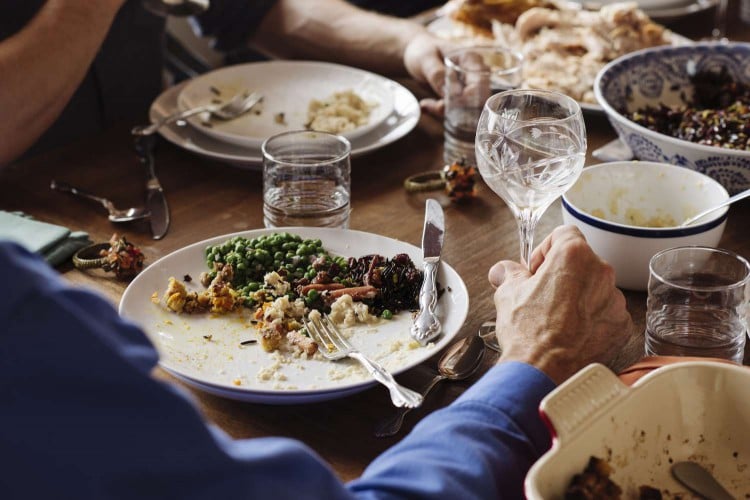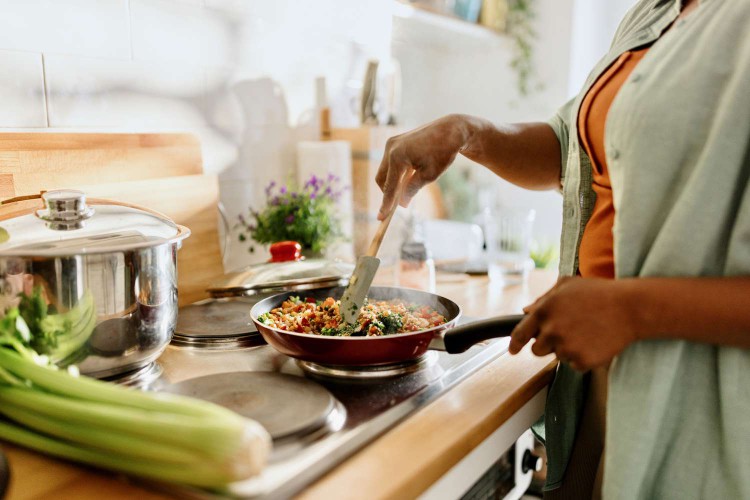- The federal government estimates that there are approximately 48 million cases of foodborne illness each year.
- Practicing food safety habits is a simple and achievable way to prevent these illnesses for yourself and your family.
- Experts recommend prioritizing food safety habits regarding hygiene, proper temperature control for groceries and leftovers, and paying attention to food recalls that may impact your household.
It might take more time or seem overly cautious, but food safety habits make a difference.
As the Netflix documentary, Poisoned: The Dirty Truth About Your Food showed, staying alert to food safety practices can be life-saving.
The filmmakers uncover realities like how many foods in the United States contain bacteria like E. coli and salmonella, as well as toxic waste that can make people sick and, in some cases, result in death.
The Federal government estimates that there are about 48 million cases of foodborne illness annually, which means about 1 in 6 Americans get sick from food each year. These illnesses result in an estimated 128,000 hospitalizations and 3,000 deaths.
“While the responsibility for food safety should not rest solely on the shoulders of consumers, we must play a role in food safety at home,” Darin Detwiler, PhD, an associate teaching professor at Northeastern University College of Professional Studies, told Health.
He provided the example of telling children to look both ways before crossing the street because while a threat may not be right in front of you, you understand that it’s best to be cautious before it’s too late.
“Food safety is no different,” he said.
Detwiler lost his 16-month-old son Riley from E. coli poisoning in a contaminated hamburger he ate at a restaurant. His story and life’s work in the food safety industry are documented in Poisoned.
“Far too many families…find themselves living with a chair forever empty at the dinner table due to mostly preventable failures in food safety,” Detwiler said. “Not all incidents take place outside of the home.”
Here’s advice Detwiler and other food experts practically apply to their own lives every day.
Getty Images / D-Keine
Don’t Disregard Food Safety Guidelines
Because a lot of food safety problems are due to manufacturers’ errors or sloppiness, it’s important to be as safe as possible at home, said Marion Nestle, PhD, MPH, author and visiting professor of nutritional sciences at Cornell.
She always:
- Cleans (everything, often)
- Separates (sterile from non-sterile foods, meat from vegetables)
- Cooks (heat kills pathogens)
- Chills (most pathogens don’t grow at cold temperatures)
Stay Away From These Foods
Nestle doesn’t buy bean sprouts, cut-bagged vegetables, or salads.
Over the past 30 years of outbreaks of foodborne illness, Detwiler said the ones that impacted or killed the most people involved bagged lettuce, sprouts, cantaloupe, undercooked meats, recalled foods, and anything that smells or looks off.
In other words, it’s best to opt for chopping your own veggies at home.
FDA Highlights Risk of Foodborne Illness From Ready-to-Eat Refrigerated Dips and Spreads
Avoid Raw Cookie Dough
“Though I do admit that I might nibble on a tiny bit myself. I think kiddos stomachs are weaker and I couldn’t live with myself if harm ever came to her for a ‘stupid’ thing like that,” she said.
Never Reuse a Plate
Cross-contamination is not to be played with. Detwiler advises people to never use the same plate they put raw meats on to place cooked meats onto unless they thoroughly wash the plate in between uses.
The Same Goes for Cutting Boards
Alexander said she would never cut chicken or shrimp or other seafood or pork “and then use the knife I cut with to cut other foods until it was washed with soap and run under extremely hot water.”
Similarly, don’t reuse the surface you’re cutting ingredients on either—it’s best to just get a new cutting board or give the one you’ve been using a thorough wash.
Defrosting Meat on the Counter Is a No-Go
Rather than letting frozen defrost on the counter, Detwiler said to always defrost in the refrigerator.
This ensures you “avoid letting foods get into The Danger Zone (between 40°F and 140°F where pathogens grow in numbers),” he said.
Additionally, he said don’t keep perishable foods out of the refrigerator or away from heat for more than two hours (or one hour if exposed to temperatures above 90°F).
Don’t Wash Your Chicken
Never wash chicken off in the sink, said Erin Palinski-Wade, RD, dietitian and author.
“This can cause bacteria to ‘spray’ onto surfaces and other foods, increasing the risk of food-borne illness,” she said.
Always Use a Meat Thermometer
Always use a meat thermometer when cooking any animal product to ensure it reaches the correct internal temperature, said Palinski-Wade.
For example:
- Poultry to 165° F
- Steaks and roasts to 145°F
- Ground beef to 160°F
- Pork to 145° F
Don’t Let Your Food Cool Down for Too Long
Hot dishes, such as casseroles and chili, should not be kept out of the refrigerator to cool down for longer than two hours.
“Put it into the refrigerator but leave the lid off until it has cooled down inside the refrigerator,” Detwiler said. “Better yet, make sure to put large items (like a chili) into a shallow pan to expedite cooling off.”
Avoid Leaving Food Out
Foods that have a good bacterial growth medium, such as chicken and dairy products, are never left out at room temperature at Nestle’s house.
“If I’m worried about whether a food is safe, I cook it,” she said.
Palinski-Wade agreed. She said the goal is to keep hot food hot and cold food cold.
“I recommend to fill your plate and store any leftovers in an airtight container in the refrigerator or freezer,” she said.
Know When It’s Time to Toss the Leftovers
While leftovers are practical, Detwiler advises people not to keep them in the refrigerator for longer than three to four days.
“Use them up or put them into the freezer,” he said.
Trader Joe’s Crackers Recalled Due to Possible Metal Contamination
Don’t Store Rice in the Rice Cooker
While it may seem like a practical storage solution, take rice out of the rice cooker after it’s cooked.
“Some people make a grave mistake of actually storing cooked rice for days on the counter. This is a perfect environment for pathogens to grow,” said Detwiler. “Try to reduce leftover rice or refrigerate immediately.”
Keep Your Utensils to Yourself
While sharing utensils and cups with people in your household can be tempting, Alexander said she avoids it.
She also avoids drinking straight from food and drink containers.
“I don’t drink out of milk cartons, eat out of ice cream containers without a clean spoon (unless the intent is to finish them) because the bacteria in your own saliva grows over time, so even if you’re a single-person household, you could make yourself sick drinking out of a milk carton,” she said.
Be Careful About Your Food Truck Bites
As a “celebrity chef” who worked at major food festivals and at other events, Alexander has witnessed improper refrigeration in these unorthodox food environments.
“Food can sit out in transit, while people wait in line,” she said. “I’ve had to refuse serving things. I once even threw things away when the people running the event weren’t looking because I didn’t want to upset anyone, but I really didn’t want to be responsible for anyone getting sick,” she said.
You never know how long something has been sitting in a food truck before it was put on your plate—choose sparingly.
Be Diligent With Meal Kits
If you order meal kits, be diligent about ensuring that the food looks and smells safe. If any item in the box is spoiled, Alexander said you should throw away everything.
“A lot of people don’t realize this, but [meal kits] are not regulated by the FDA or any other agency the way food brands are,” she explained. “They are treated like ‘catering,’ which has a lot less ‘checking.’”
Alexander has witnessed behind the scenes of a popular meal kit company that didn’t have refrigeration on the loading dock of their warehouse. The food was brought into a room to be sorted, and then put in the refrigerator later.
“Just because ingredients are ‘cold enough’ at the time of unboxing, doesn’t mean they were cold enough through the whole ‘chain’ of it getting to you,” she said.
She encourages everyone to use a meat thermometer upon receiving products from meal kit companies.
Rely on Your Cooler
Because Palinski-Wade’s family is always on the go, she often packs meals and snacks.
“But food sitting out in a hot car or at a park for long periods of time can become a breeding ground for bacteria. Instead, use a cooler to keep food refrigerated until you are ready to eat,” she said.
This applies to lunch bags without proper refrigeration, added Alexander.
“We were given these bags from our public school last year that the PTA purchased. They had a built-in bento box situation, and a tiny little ice pack,” she said. “If you’re dropping your kiddos off after you pack that at 7 AM and they don’t eat until 11, that ice pack…has long since melted.”
Wash Your Hands Before Unloading the Dishwasher
Detwiler always washed his hands before unloading the dishwasher.
“Why undo the sanitation work by touching dishes and utensils with dirty hands?” he asked.
Don’t Dismiss Food Recalls
If food in your house is recalled, Detwiler said to return it to the store if possible, if not, throw it away.
“Be aware that if anyone ate some of the recalled food, there may be a need to take action,” he said. “But be aware that not all food recalls are the same.”
Some food recalls are due to conditions that can harm a consumer, such as a pathogen or an allergen, and even foreign material, such as glass, plastic, and rocks, while others are due to labeling or inspecting issues, and may be of less potential harm, Detwiler explained.
Look for details of the recall, assess the risk to you and members of your household, and respond accordingly.
Kraft Recall: American Cheese Singles Recalled Due to Gagging, Choking Risk








